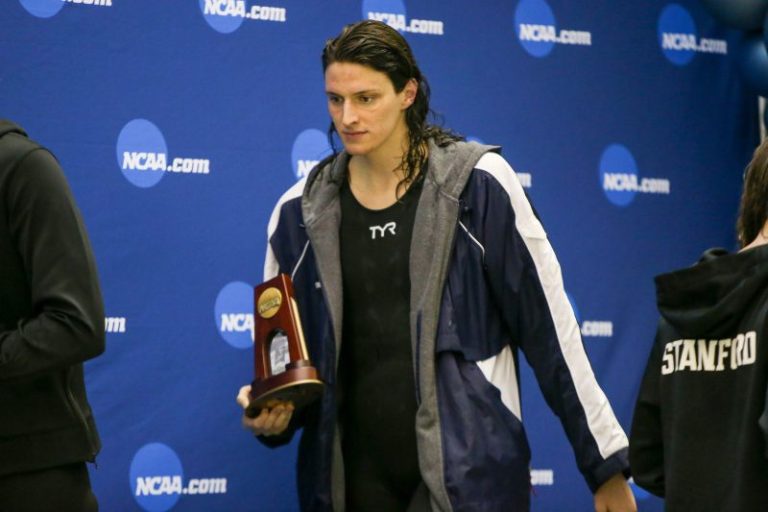The federal investigation into the University of Pennsylvania surrounding transgender athletes reached a resolution that will wipe out the school records of Lia Thomas.
The U.S. Department of Education announced the resolution on July 1, stating the university will comply with Title IX after it allowed Thomas, a transgender athlete, to be part of the women’s swimming team. Now, the university must not allow transgender athletes to compete in female athletic programs, in addition to erasing Thomas’ achievements.
The agreement comes as President Donald Trump has made it a point of his presidency to ban transgender athletes from competing female sports. He’s passed executive orders and threatened legal action regarding the issue, and it’s resulted in changes to college sports.
Did NCAA allow transgender athletes in women’s sports?
Yes. Thomas began transitioning in 2019 with hormone replacement therapy and followed the then-established NCAA and Ivy League rules. In 2022, the NCAA updated its transgender athlete policy. The update took a sport-by-sport approach that ‘preserves opportunity for transgender student-athletes while balancing fairness, inclusion and safety for all who compete.’ At the time, it aligned with decisions by United States Olympic and Paralympic Committee, as well as International Olympic Committee.
Under the policy, at the start of the 2022-23 academic year sports calendar, transgender student-athletes had to document sport-specific testosterone levels at the beginning of their season, six months after the first and four weeks before championship selections.
Thomas won the NCAA Division I title in the women’s 500-yard freestyle event in the spring of 2022 before the policy went into place.
How Trump Administration impacted transgender athletes
Trump had emphasized during his president campaign his goal of blocking transgender athletes from competing in women’s sports. On Feb. 5, less than a month into his presidency, Trump signed an executive order that bars transgender women and girls from playing on school sports, and it would cut off federal money for schools that don’t comply.
In April, Attorney General Pam Bondi announced legal action against Maine for refusing to ban transgender athletes from participating in women’s sports. In June, Trump threatened fines in California and the Justice Department threatened to sue the state’s public high schools after a transgender athlete was allowed to compete and won two medals at the track and field state championship.
Did NCAA transgender athlete policy change?
Yes. One day after Trump’s executive order, the NCAA changed it’s policy to only allow student-athletes assigned female at birth could compete in women’s sports. The policy was ‘effective immediately and applies to all student-athletes regardless of previous eligibility reviews under the NCAA’s prior transgender participation policy.’
The updated policy states a student-athlete assigned female at birth ‘who has begun hormone therapy” may not compete on a women’s team, and if they participated in any NCAA competition, the team would not be eligible for NCAA championships. The organization did state individual schools have the autonomy to determine athletic participation on their campus.
“We strongly believe that clear, consistent, and uniform eligibility standards would best serve today’s student-athletes instead of a patchwork of conflicting state laws and court decisions. To that end, President Trump’s order provides a clear, national standard,’ NCAA President Charlie Baker said in a statement.
How many transgender athletes are in the NCAA?
The number reflects a similar percentage to how many transgender athletes compete in sports, starting at youth sports. According to the UCLA Williams Institute, transgender youth make up only 1.4% of American teenagers. A 2017 study of 17,000 young people found that about 1 in 10 transgender boys said they played sports, and it is roughly the same figure for transgender girls.
Lia Thomas records: What happens to them?
What happens to Thomas’ NCAA records is unclear. The NCAA did not respond to a request for comment. Thomas won the women’s 500-yard freestyle event in 2022, and she tied for fifth in the women’s 200-yard freestyle and eighth in the 100-yard freestyle.
However, Thomas’ records at Penn will be erased. She currently holds the records for:
100 freestyle (47.37)
200 freestyle (1:41.93)
500 freestyle (4:33.24)
1,000 freestyle (9:35.96)
1,650 freestyle (15:59.71)

